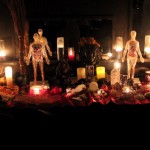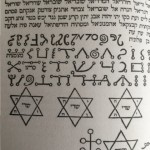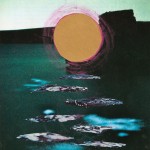The other day, I was looking through Elizabeth U. Harding’s Kali: The Black Goddess of Dakshineswar for another post I’m working on, when I came across this quote by Sri Ramakrishna I’d forgotten about:
Art Thou true, Mother, or is it all fiction–mere poetry without any reality? If Thou dost exist, why do I not see Thee? Is religion a mere fantasy and art Thou only a figment of man’s imagination?
I smiled. It’s always a relief to be reminded that even the legendary mystics had doubts, because it lets us ordinary folk know we’re doing okay. I often have doubts about my practice: What if it’s all fake? What if I’m deluding myself? What if I’m making it all up?
(A quick side note: when I took my first Reclaiming class, our teacher told us unambiguously that we are “making it up”–and that doesn’t make “it” any less real. But that’s a subject for another post.)
These moments of doubt are certainly uncomfortable, but they can also be transformative. They’re not dangers we need to shy away from, but rather opportunities for reflection. What if there’s no Goddess? What if magic is nothing but self-deception? What if Witchcraft is absolutely pointless?
Is it still worth doing?
When I returned to Witchcraft after my hiatus, I made myself a promise: I would practice magic, but I would not become superstitious. To many people, that statement may seem blatantly paradoxical. There are a few different definitions of superstition out there, some of them kinder than others, but I found it useful to craft one that applied to my own practice: superstition, for me, is a spiritual or magical practice born from fear instead of love.

Figuring out this definition was important to me, because I grew up in a world of superstition. The Fundamentalist Christians in my Orange County town believed that life–a whole human life!–was nothing but a test to see if you could avoid masturbating enough to get into Heaven. A friend of mine who’d escaped an ultra-Orthodox Jewish community told me a particularly stunning belief held by her family: any wine they drank couldn’t be seen by gentiles, or it would become undrinkable. “What if there happened to be a Gentile eating dinner with them?” I asked, knowing that because of the insularity of these communities, that would never happen. My friend thought for a moment. “Then we would hold a book in front of our glasses and raise it up along with the glass as we drank,” she said. “We’d make sure the glass was hidden all the way up to our mouths.”
And lest you think we enlightened Pagans have moved far beyond superstition (I know none of you actually think that): last year I briefly interacted with a Witch who was in the process of alienating herself from the entire LA Pagan community in the belief that she was being contaminated by grey magic practitioners. I really hope she’s doing better now.
In my years away from Witchcraft–most of which were spent studying Secular Buddhism, which focuses on the material world–I learned an important lesson: no one has to do religion if they don’t want to. You don’t have to cast a spell in order to get a new job. No deity can force you to worship them. Yes, magic and religion have powerful, wondrous effects, but they’re not necessary for a fulfilling, ethical life. I know too many happy atheists and ex this-or-thats (including ex-Pagans) to think otherwise.
So, here’s a simple litmus test I perform whenever I feel the joy leaking out of my magic, or a fear of “doing it wrong” seeping in. Would I still do this thing–this prayer, this Tarot reading, this ritual–if it turned out that it was all fake? The deity, a figment of my imagination? The reading, apophenia and confirmation bias? The ritual, an overly-complicated way of setting a goal or activating some pleasure center in my brain?
I know I’m on the right track when I can answer “yes.” Yes, the prayer still fosters wisdom, even if I’m the only one listening. Yes, the reading is still useful, even if it only guides me towards knowledge I already had. Yes, the ritual is still beautiful and profound, even if nothing mystical occurs. Sure, a spell might look very different if I didn’t think there was anything magical happening at all. But when my spiritual life is healthy, the practice is its own reward.
I found that the deepest, most life-changing effects of my magic–the precognitive dreams, the spells that worked, the unmistakable messages from deities–only began to happen after I stopped caring about whether or not it was all “real.” Conversely, whenever I forget that most people who get what they want do so without candles or poppets, or when I start to get tangled up in other people’s dogma, that’s when my magic sputters and goes out.
Of course, my definition of superstition won’t work for everyone. And yeah, I still do my share of quotidian “better safe than sorry” magic like protective spells and cleansings, because they work! But even when I’m smudging my home to keep the poltergeist from breaking my dishes,* I make the act a beautiful one. I breathe the heady scent of sage; my movements become a dance. I don’t want my magic to ever become a tired obligation. I don’t ever want to become that person who has to hold a book in front of my face so I can drink my wine.
How do you distinguish between spirituality and superstition? Do you find you need that distinction at all? How do you keep your practice rooted in joy and love, rather than fear and dogma?
*I am about ready to strangle that poltergeist.
















